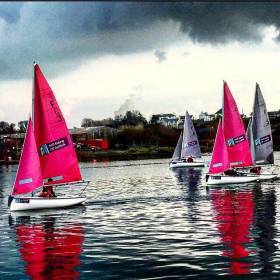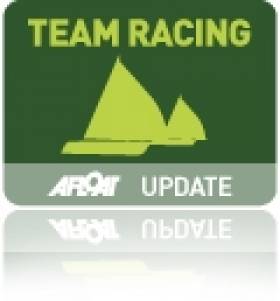Displaying items by tag: varsity
UCD Win Varsity Championships at Kilrush Marina
UCD reigned at the Varsity Team Racing Championships at Kilrush Marina in County Clare, the last national event of the year in the college sailing calendar. The event was organised by Trinity sailing and DIT Sailing Club.
Teams from around Ireland were on the Shannon Estuary from 24th-28th of February for the IUSA Inter-Varsity champions 2016.
The sheltered Kilrush Creek provided an ideal racing area for both competitors and spectators.
The event kicked off on Thursday with 27 teams from 11 different universities from Ireland and the UK competing in 4 different round robin flights. UCC1, Loughborough University, CIT and UCD1 came out on top of each flight after the first day. The teams were split into Gold, Silver and Bronze for a second round robin on Friday before entering the knockout stages on Saturday. The quarter finals saw some intense racing with Trinity winning over the undefeated reigning champions, UCC1. UCD1 raced UCD2 in the semi finals and Trinity came up against Loughborough University.
The best of 5 final came down to colours rivals, UCD and Trinity in light, challenging conditions. While Trinity won the first race, UCD came back with 3 consecutive wins, taking the varsities title. UCD2 were the third placed team.
Full Results:
Gold Fleet
1. UCD1
2. TCD1
3. UCD2
4. Loughborough University
Silver Fleet
1. UCD3
2. CIT
3. TCD6/DIT
Bronze Fleet
1. Queens University Belfast
2. UCD4
IUSA Awards
• Sailor of the year: Scott Flanigan, TCD
• Crew of the year: Cliodhna Connolly, UCD
• Fresher of the year: Mark Bolger, TCD
• Club of the year: CIT
• Event of the Year: IUSA intervarsities hosted by TCD & DIT
UCC Reign as Intervarsity Irish Champions
#teamrace – A very exciting and eventful finals series on Saturday, produced an all UCC final, with UCC1 facing off against UCC2. UCC1 won the first three races of the five race final which saw them being crowned Intervarsity Champions for 2014/2015. From the 26th to the 28th of February UCC Sailing Club hosted the IUSA Intervarsity Championships in the Fastnet Marine Outdoor Education Centre, Schull, Co. Cork. The event consisted of three days of highly competitive racing, despite the extremely heavy conditions. Days one and two saw 28 teams racing in three fleets (Gold, Silver and Bronze), which were selected according to team rankings based on the results of the regional events this season.
On day three, the top 16 teams were selected for the finals series, with the winners of each respective race going on to quarter finals, namely University College Cork 1, University College Cork 2, University College Dublin 1, University College Dublin 4, Trinity College Dublin 1, Scottish University Sailing Association, Loughborough University and Cork Institute of Technology 1.
Sadly, due to the increasingly adverse conditions, the race committee were forced to cancel the Silver and Bronze fleet finals and therefore their prizes were awarded based on the standings from the first two days of racing.
The semi-finals saw defending champions UCD1 narrowly lose out to UCC2 and UCC1 overcome SUSA. As a result, the host club found themselves in an all-UCC final, with UCC1 coming out on top, securing victory over their fellow club members by winning the first three of the best-of-five final.
The awards ceremony took place on Saturday night, with the National University of Ireland Galway being awarded Best Club of the Year for their tremendous efforts in promoting and enhancing their club over the past year, and for being incredibly compliant and helpful to any club who hosted events during the season. Event of the Year was awarded to UCD who hosted the Eastern Championships in Blessington earlier in the year. First Year Sailor of the Year was awarded to newly crowned Intervarsity champion, Fionn Lyden of UCC1. Sailor of the year went to the very deserving Philip Doran of UCD1.
On behalf of UCC Sailing Club I would like to thank everybody who partook in the organisation and running of this event, in particular the Irish University Sailing Association committee, the volunteers (including many UCCSC alumni), the race committee – lead by Denis Quinlan, the umpires, everyone in the Fastnet Marine Outdoor Education Centre, the community of Schull, and our fellow university clubs.
Gold Fleet prize winning teams:
UCC1: Cian O' Regan, Fionn Lyden, Aidan McLaverty, Eimear O' Leary, Dave Healy, Niamh Ní Chonghaile
UCC2: Ross Murray, Brendan Lyden, Conor Lyden, Liam Manning, Chloe Crosbie, Emma Geary
UCD1: Philip Doran, Conor Murphy, Rory Lynch, Tara Flood, Clíodhna Connolly, Ally Morehead






























































